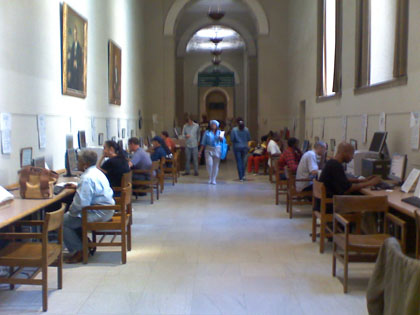
Federal broadband stimulus dollars will bring 800 new public computers to Philadelphia, the same number currently available throughout the Free Library‘s 54 regional branches.
On Friday the Division of Technology announced that it will receive $6.4 million in federal dollars to fund public computer centers, new and old, throughout the city, according to a press release.
Twenty-five existing computer centers will be improved and 48 centers created at anchor institutions that include city recreation centers, homeless shelters, public housing and community-based organizations. Hours of access at the existing public centers will also be increased, providing for 14,000 more people per week.
The project—led by DOT—includes partnerships with the Department of Parks and Recreation and the Free Library of Philadelphia. Philadelphia FIGHT, the People’s Emergency Center, Philadlephia OIC and Media Mobilizing Project will also be involved.
The grant comes as part of the National Telecommunications and Information Administration‘s federal broadband stimulus funds—more than $4 billion for broadband-related projects—set aside by the American Recovery and Reinvestment Act.
If ever there was an example of the impact 800 new computers will bring to the region, it’s that which was evidenced in our September piece about last year’s state budget crunch, which threatened the availability of the Free Library’s public access computers.
The library system—which now serves patrons on 800 existing computer terminals—accounts for 1.3 million annual computer reservations.
It’s in our libraries and at public computer centers that folks without computer and web access have the opportunity to take advantage of what many with access may take for granted. It’s estimated that about 50 percent of the region’s households are without broadband Internet access.
Last August, the City of Philadelphia applied for $35 million of the broadband stimulus pot through several grant applications, as we reported.
There were doubts about Philadelphia’s stimulus opportunity after state officials responsible for recommending projects gave the city’s grant applications poor marks, as we reported.
But contrary to the Governor’s office highest recommendation—a $2.3 million bid from the Philadelphia Housing Authority—it was the city’s application to improve public computer centers which appears to have most impressed the feds, though its originally proposed $14 million budget was more than halved.
Preparation for the city’s application began in May 2009, when Chief Technology Officer Allan Frank began assembling stakeholders throughout the city to discuss Philadelphia’s digital future, as we reported in our comprehensive coverage of the process.
As part of what Frank has called his “Digital Philadelphia” vision, those stakeholders began completing several federal broadband stimulus grant applications, including one to help improve network infrastructure throughout the city and several for computer implementation and education, like the one awarded Friday. Partners like the Free Library, Media Mobilizing Project and others were closely involved in drafting the application.
After it seemed unlikely that the city would receive funding for its middle mile network infrastructure improvements—the possibility of federal funding seemed more plausable for its computer centers—the Division of Technology applied for the opportunity to become a test candidate for Google’s ultra-high speed fiber broadband in May, as we reported.
Google’s candidates are expected to be announced this fall.






